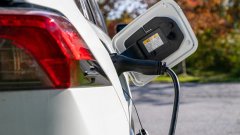
South Korea's LG Energy Solution signed an agreement to supply , the world's largest automaker, with for electric vehicles that will be assembled in the U.S., the companies said on Wednesday.
The deal will support Toyota's expanding battery EV line-up, which includes a new model that will be assembled at a manufacturing plant in Kentucky — its largest globally — starting in 2025.
"The one thing I wanted to change was the fact that we don't have any business with the number one player Toyota," LG Energy Solution CEO Youngsoo Kwon said in an exclusive interview with CNBC aired on Thursday.
"So now we have nine of the 10 top automakers as our clients," said Kwon, adding that LG Energy Solution will supply Toyota with 20 gigawatts worth of batteries every year from 2025.
for three consecutive years, having sold nearly 10.5 million vehicles in 2022.
Toyota's Tokyo-listed shares rose 2.91% in morning trading Thursday.
LG Energy Solution also supplies other automotive giants such as America's , South Korea's Hyundai, and Japan's . Less than five months ago, LG Energy Solution said it will in the U.S. with Hyundai, in a bid to leverage tax credits.
Buyers of U.S-made vehicles are eligible for up to $7,500 in tax credits under the Inflation Reduction Act.
"Inflation drew up investment amounts and labor costs have gone up for various reasons. Things are tough. The IRA tax credit is big, and it gets offset in the U.S. market. That's why we are investing, building factories and supplying in the U.S.," said Kwon.
LG Energy Solution will invest about 4 trillion Korean won ($3 billion) "to establish new production lines for battery cells and modules exclusively for Toyota, with completion slated for 2025."
The Japanese car maker aims to offer 30 battery-electric vehicle models across its Toyota and Lexus brands and produce up to 3.5 million BEVs annually by 2030.
LG Energy Solution is currently the EV battery producer after Chinese EV player BYD, according to data from South Korean energy market research firm SNE Research.
Chinese companies dominate the sector even as EV adoption increases globally. , capturing 36.6% of the global EV battery market from January to July this year, according to SNE Research.
"It's essentially a competition between Chinese and Korean companies, though we have Japan's Panasonic too. I think it's too early to fully assess the capabilities of the Chinese battery makers," said Kwon.
"CATL is manufacturing mostly out of China. Keeping the production within China is very easy. This is a global business, so it needs to involve global operations."
"It was easy for us to stay within South Korea. But we faced tremendous challenges in Poland as well as the U.S. I think whether Chinese players can do well with their global operations will be the factor who decides who wins between Chinese and Korean companies," said Kwon.



